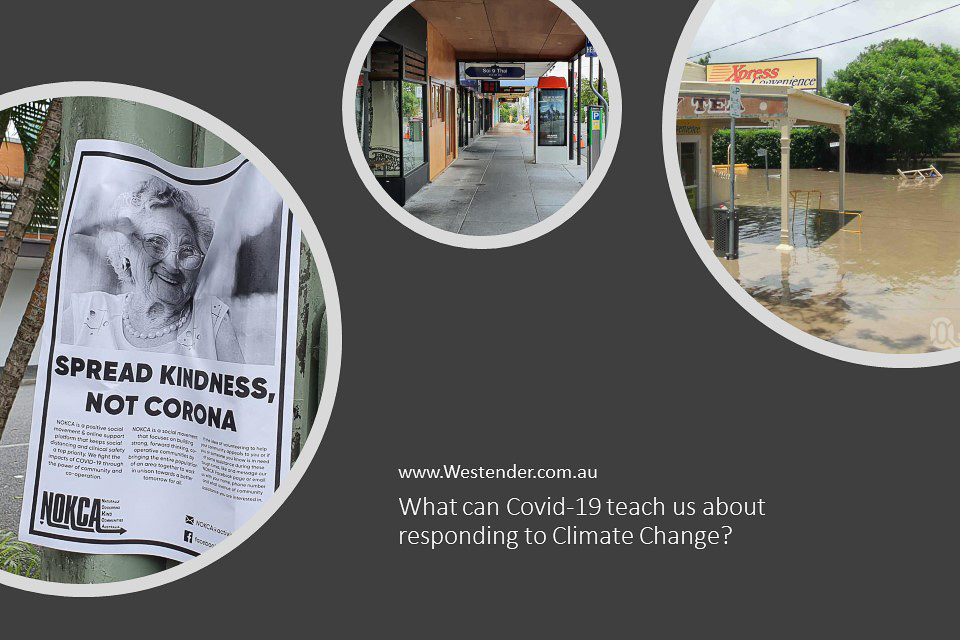Given the covid-19 emergency has occurred in the middle of a Council election campaign, the Westender decided to seek comment from the Gabba Ward Candidates.
We asked them what they think Governments, Council, and candidates, can learn from the current emergency about planning for and responding to the impacts of climate change. They were asked to keep responses to 500 words or less.
Responses were received from The Greens Jonathan Sri, and from Labor’s Rachel Gallagher. We thank them for getting back to us so quickly in what is a very demanding and uncertain week for them, and us all.
Rachel Gallagher – Labor
“I draw similarities between the COVID-19 emergency and the climate emergency. But there are also stark differences.
For COVID-19, our most vulnerable groups are people in their 60s and above, as well as others with pre-existing health conditions. But climate change will mostly affect younger people and our children.
The community, particularly young people, have mobilised to protect those most vulnerable to COVID-19, as they should.
We’ve taken the economic hit. We’ve lost our shifts, we’ve stopped going out, which effects our local businesses. And this is just the beginning.
The crisis demonstrates how quickly our governments can act when they need to. It also shows how quickly the community can mobilise when facing a major crisis.
Yet, after this health crisis is over, will the broader community mobilise to protect us and future generations from the impacts of climate change?
Because we now know that we can.
My daughter, and all children, don’t have an electoral voice right now.
So whoever you vote for on March 28, I implore you to vote for a candidate that takes climate change seriously, who is looking towards the future to take the action required for our children’s sake – and, importantly, has the ability to deliver”.
Jonathan Sri – The Greens
- While it’s easy to rapidly disseminate simple announcements, all levels of government lack the ability to communicate detailed and complex information during a crisis and are slow and ineffective at countering misinformation. For example, late last Friday afternoon, the PM announced a ban on large events, but key government web pages were still telling the public that attending events was fine and weren’t updated until after the weekend.
- The kinds of questions my office has recently received from residents reveal major gaps in knowledge. People have a general idea of what’s going on and how the government is responding, but do not understand the details and don’t know where to find reliable, up-to-date info. We need to strengthen existing systems for disseminating reliable information, including increasing funding for public media institutions like SBS and the ABC, as well as local community media like 4ZZZ Community Radio, 4EB Ethnic Community Radio and 98.9 Murri Community Radio.
- Ongoing hoarding and ‘panic buying’ shows how little trust and faith many people have in their government to protect and care for them during times of crisis. Even when multiple political leaders advise otherwise, this behaviour continues. People intuitively understand how fragile everything is, and when politicians try to tell them otherwise, it just makes them more suspicious.
- We’ve now seen how inadequate capitalism’s ‘just-in-time’ approach to the management of supply chains for essential goods and services really is. Leaving everything up to the ‘free market’ is not working very well and leaves us incredibly vulnerable even to minor disruptions. This includes the provision of housing. If a tenant can’t pay their rent, their landlord can’t pay the mortgage, and the system quickly falls apart.
- BCC does not have a robust and up-to-date picture of the community services and projects that are so important to our society and is poorly positioned to support those groups in their mission to support the community. If a local resident contacts the council saying “I want to volunteer to support someone in my community,” the council’s response has been to refer back to larger bureaucratic institutions like the Red Cross, who are not set up to direct and coordinate a huge influx of volunteer energy in times of crisis. While inner-city communities like Woolloongabba and West End in particular are better off than many other parts of the city, nowhere in Brisbane currently has the deep and resilient community relationships and networks that we will need to cope with multiple overlapping crises and disasters.
Many residents have responded by setting up new support groups and initiatives, unaware that they are creating parallel systems which unnecessarily duplicate stuff that’s already happening in the community.
There’s a lot more I could say about how our community is responding and what all elected representatives (including myself) could have done better, but I’m already over the word limit.”
The Westender did not receive a response from the LNP candidate.
For more on the election in The Gabba Ward, see HERE


Latest Comments